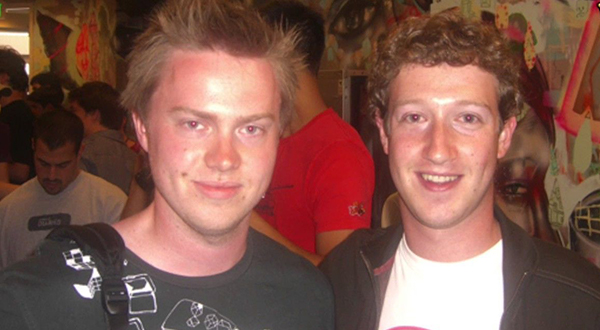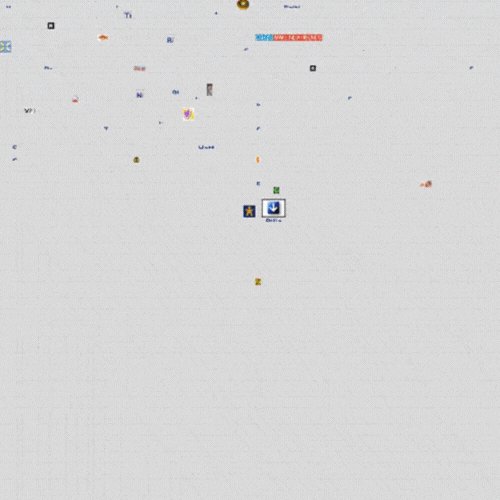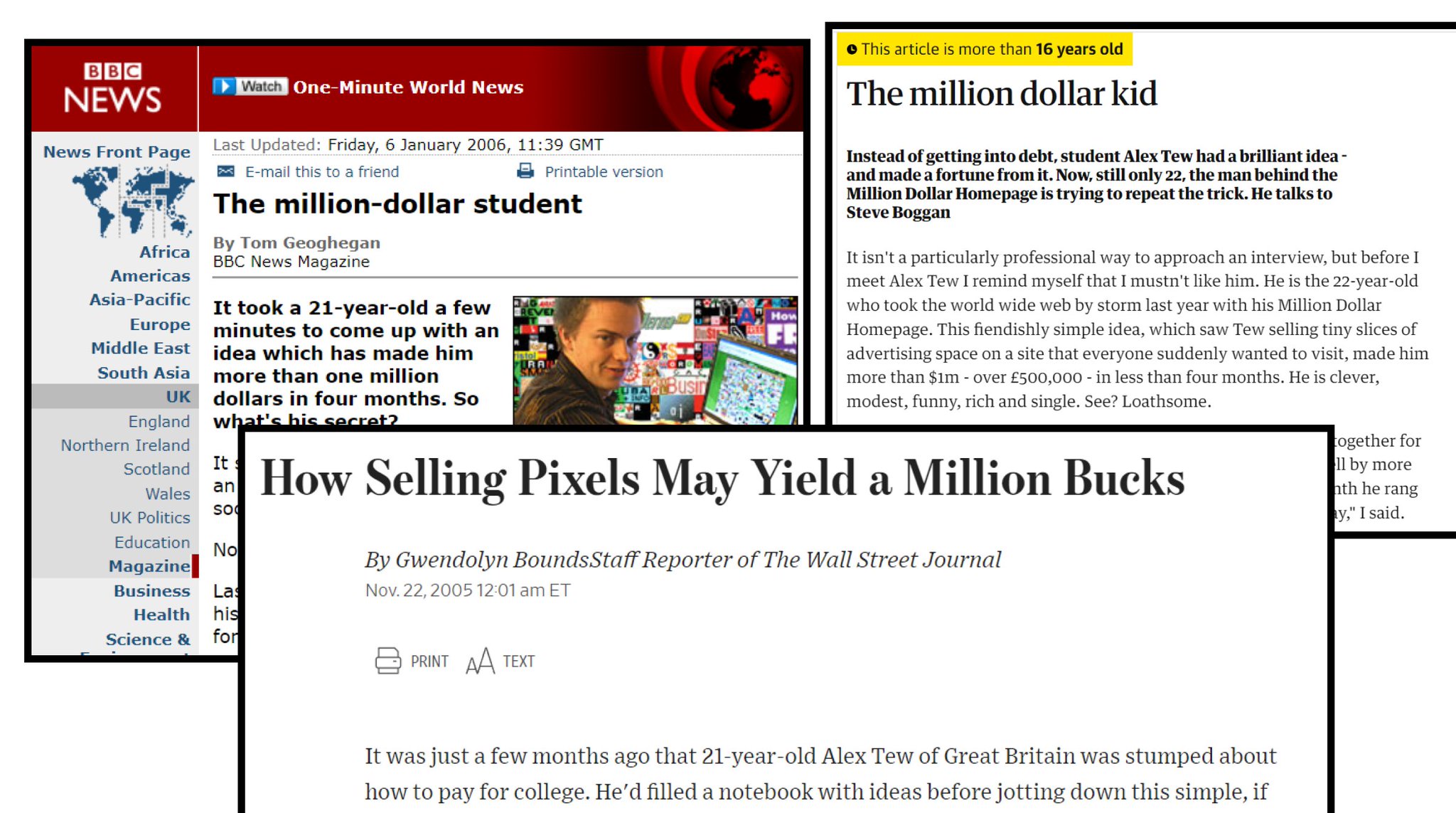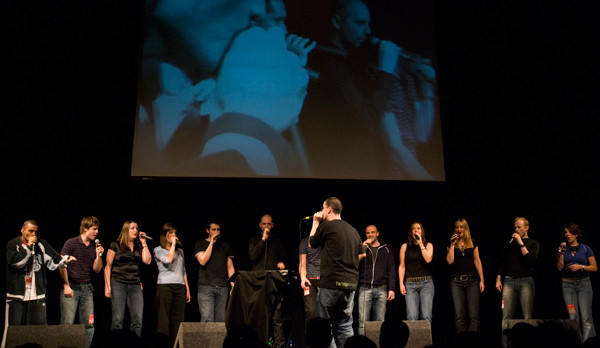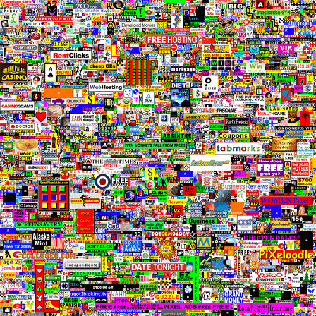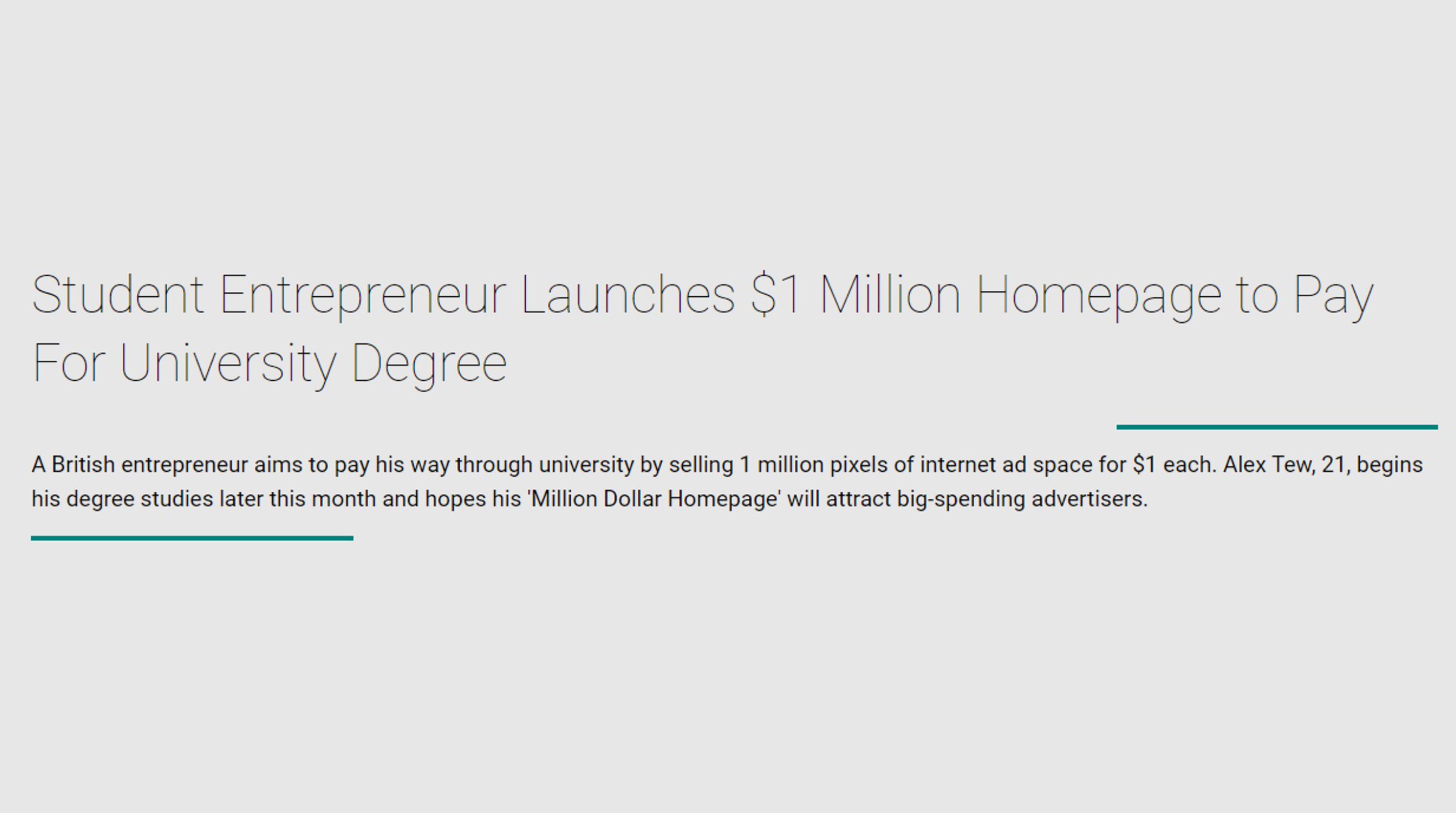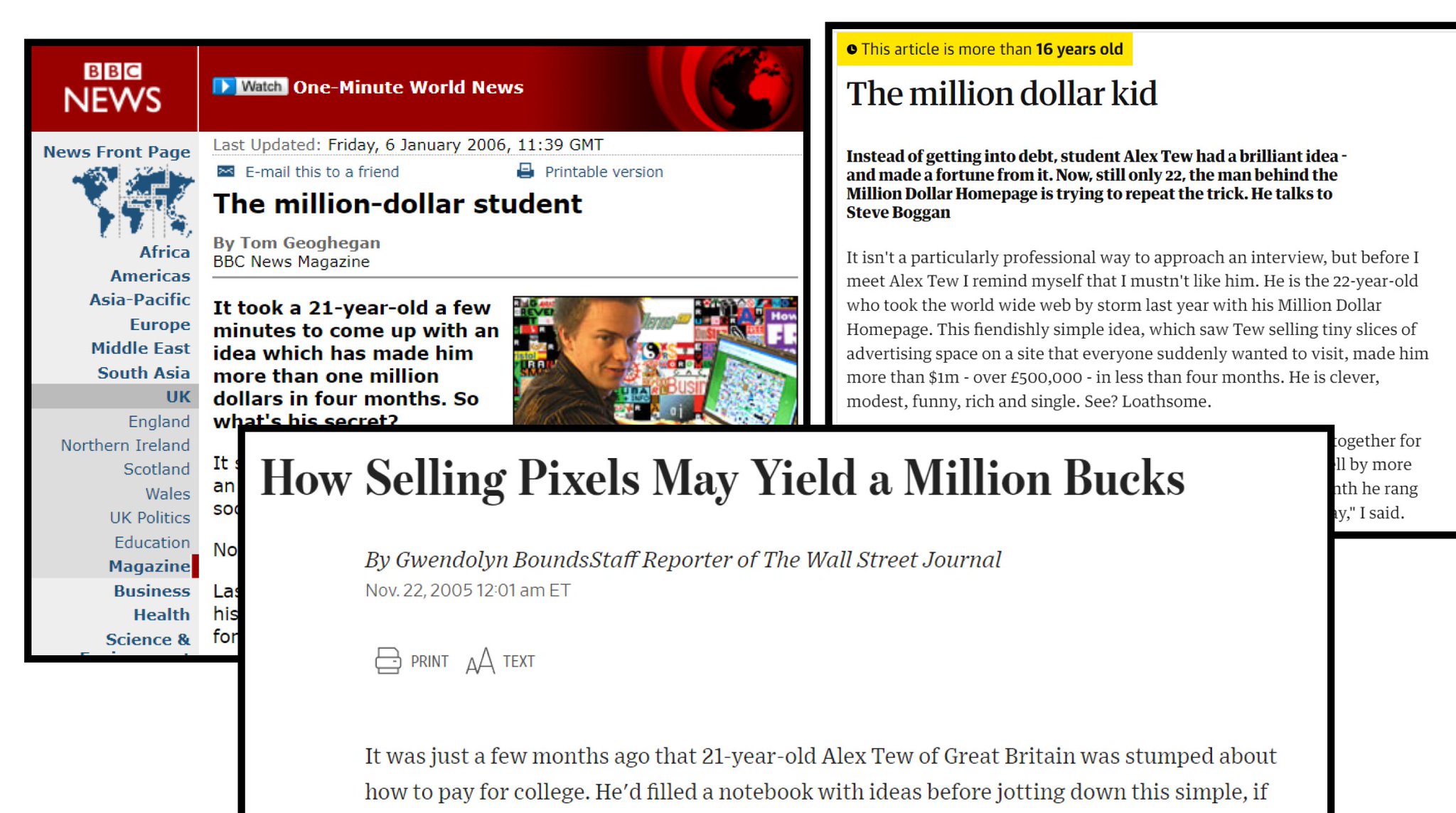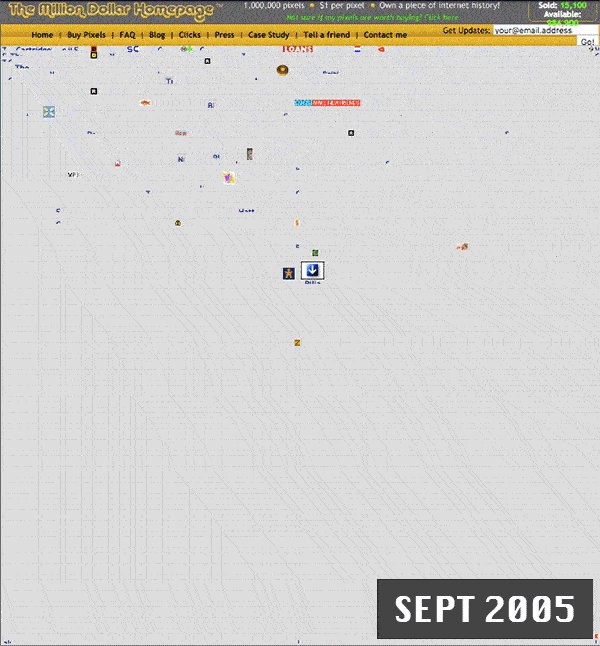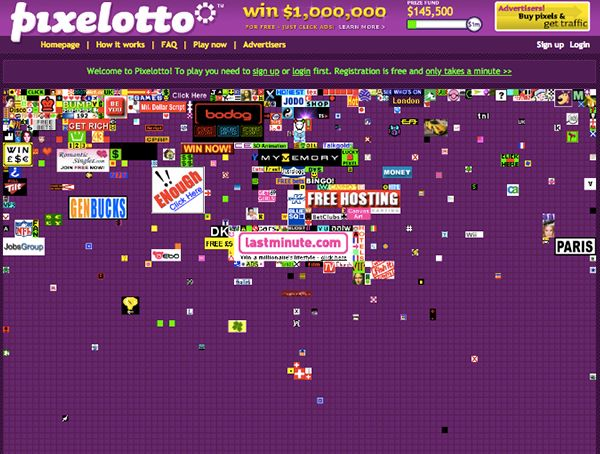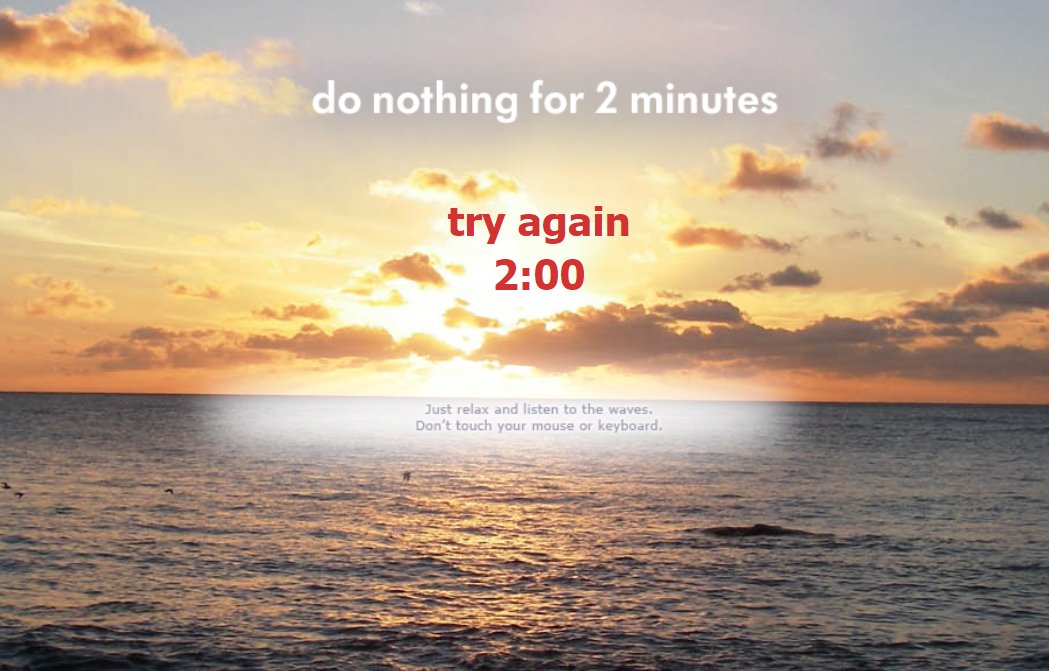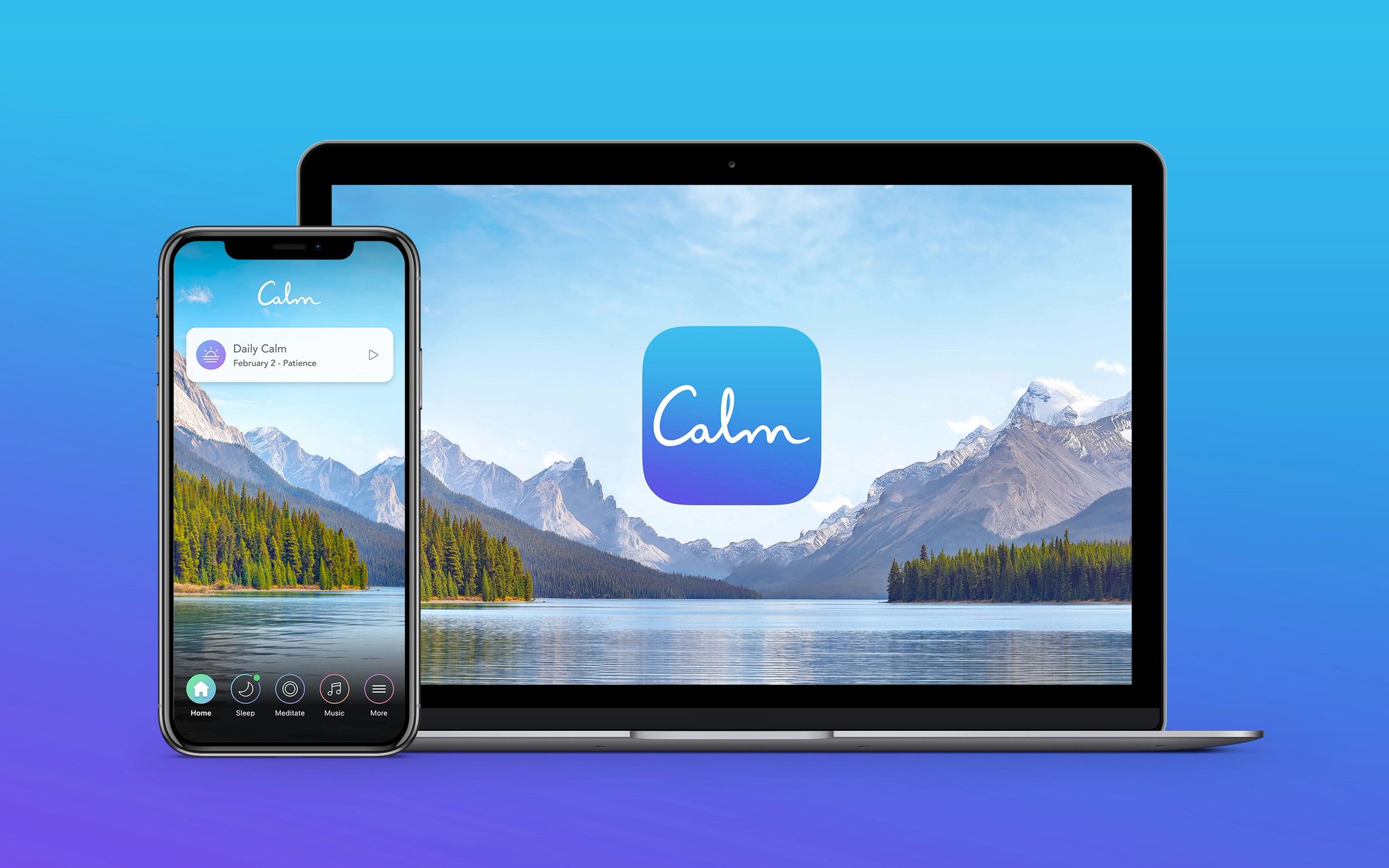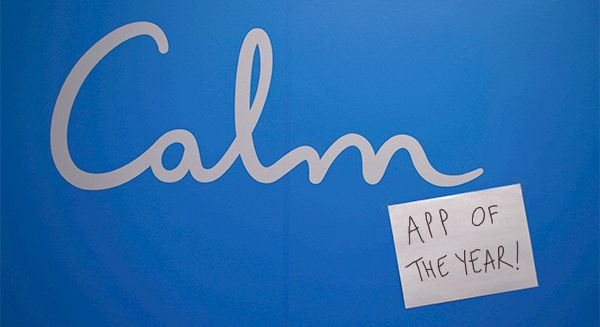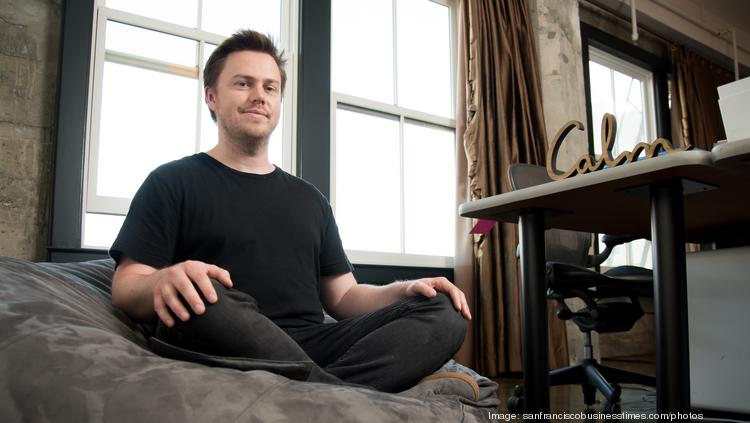Thread
This kid made $1M+ in just 4 months by selling pixels on a website.
7 years later he built a $2B meditation company.
The guy you probably know, the story you don't 👇
7 years later he built a $2B meditation company.
The guy you probably know, the story you don't 👇
Meet Alex Tew built 'The Million Dollar Homepage' - a static website with 1M pixels of advertising space.
Within just 30 days of launch, Alex had pocketed $250k and was getting 65k visits a day.
By October 2005, the website had over 1.4k advertisers.
Within just 30 days of launch, Alex had pocketed $250k and was getting 65k visits a day.
By October 2005, the website had over 1.4k advertisers.
It became such a sensation that it was picked up by the BBC, the Guardian, and the Wall Street Journal.
Alex made $1.04M from the homepage at 21.
CRAZY!!
Alex made $1.04M from the homepage at 21.
CRAZY!!
When he was just 8, he sold his hand-drawn comics in the schoolyard for $5 each.
In 2002, when he finished high school, Alex made a bold decision.
He said "later" to college and chased an unconventional dream: Beatboxing
Under the alias “A-Plus" he toured around the UK and launched the world’s first beatboxing forum HumanBeatbox.com
He said "later" to college and chased an unconventional dream: Beatboxing
Under the alias “A-Plus" he toured around the UK and launched the world’s first beatboxing forum HumanBeatbox.com
The forum united beatboxers worldwide.
It became "the place" for beatboxers around the world to bond.
They even gathered a 200 people convention where they swapped tips on everything from snare drum replication to nose humming.
It became "the place" for beatboxers around the world to bond.
They even gathered a 200 people convention where they swapped tips on everything from snare drum replication to nose humming.
But after a few years of stagnant growth, he sold the site to a friend.
“I was living at home, and I was fed up with being broke,” he said.
So he asked himself a simple question: "How can I make a million dollars?”
“I was living at home, and I was fed up with being broke,” he said.
So he asked himself a simple question: "How can I make a million dollars?”
You see, Alex was worried about student loans because he had freshly enrolled at Nottingham's biz school
So, one August night in 2005, he whipped out a notepad and dreamed up cheap products he could sell a million of.
So, one August night in 2005, he whipped out a notepad and dreamed up cheap products he could sell a million of.
Most ideas were bad: “Gum Slinger” (a small pouch for used chewing gum).
But this one idea was fucking great:
"A webpage featuring 1 MILLION PIXELS up for grabs at $1 EACH."
But this one idea was fucking great:
"A webpage featuring 1 MILLION PIXELS up for grabs at $1 EACH."
In 2 days, he whipped up the website.
August 26, 2005 dawned and the site was live.
It cost him $50 in domain fees, but that was a small investment for what he was going to make—$1M.
August 26, 2005 dawned and the site was live.
It cost him $50 in domain fees, but that was a small investment for what he was going to make—$1M.
The business model was really simple:
"For $100 or more, advertisers could purchase a 100-pixel block (a 10x10 grid) and plaster it with their logo or image, complete with a hyperlink.
The only rule: It shouldn't be porn."
"For $100 or more, advertisers could purchase a 100-pixel block (a 10x10 grid) and plaster it with their logo or image, complete with a hyperlink.
The only rule: It shouldn't be porn."
Within 14 days, Alex got his friends and family to buy up to 4.7k pixels = $4.7k.
Using the profits, he hired a PR firm to draft a release.
Using the profits, he hired a PR firm to draft a release.
Crazily, it got picked up by the BBC, The Guardian, and the Wall Street Journal.
That day the site made $3000!
It was a huge win for Alex!
That day the site made $3000!
It was a huge win for Alex!
Within 30 days, Alex made $250k and was getting 65k visits a day.
By October end, the website had over 1.4k advertisers.
And Alex was $500k richer.
By October end, the website had over 1.4k advertisers.
And Alex was $500k richer.
By New Year's Eve 2005, only 1000 pixels remained.
Instead of selling them directly, Alex auctioned them off for $38k.
Alex made - $1.04M from the MillionDollarHomePage.
Instead of selling them directly, Alex auctioned them off for $38k.
Alex made - $1.04M from the MillionDollarHomePage.
4 months earlier, Alex was a broke 21-year-old.
Now he was a MILLIONAIRE.
Now he was a MILLIONAIRE.
With $700k in in-hand cash, Alex dropped out of college after just one term.
But his success came at a cost.
He became fixated on ideas that would grab attention rather than deliver actual value.
But his success came at a cost.
He became fixated on ideas that would grab attention rather than deliver actual value.
From 2006 - 2010, Alex launched a series of similar projects -
• Pixelotto (lottery side; made $200k+ from it)
• PopJam (social media humor site)
• OneMillionPeople (similar to MillionDollarHomepage, just instead of pixel ads, it was photos of people)
• Pixelotto (lottery side; made $200k+ from it)
• PopJam (social media humor site)
• OneMillionPeople (similar to MillionDollarHomepage, just instead of pixel ads, it was photos of people)
All these ideas were unoriginal and did not have any real value.
Alex realized that he couldn't replicate the same magic.
So he left for Silicon Valley and joined a friend's incubator.
Alex realized that he couldn't replicate the same magic.
So he left for Silicon Valley and joined a friend's incubator.
During this period, Alex's mental health suffered.
He struggled with depression as he neglected his sleep, diet, and meditation practice.
He struggled with depression as he neglected his sleep, diet, and meditation practice.
To solve his problems, Alex decided to build simple tools.
One of them was donothingfor2minutes.com, a 2-minute timer that prompts the user to take a break and "do nothing".
One of them was donothingfor2minutes.com, a 2-minute timer that prompts the user to take a break and "do nothing".
People were becoming more aware of the negative effects of technology on mental health and seeking ways to disconnect.
The timing was perfect!
So, in 2012, Alex decided to launch a meditation app that would cater to these needs - Calm.
The timing was perfect!
So, in 2012, Alex decided to launch a meditation app that would cater to these needs - Calm.
Calm exploded in popularity as soon as it launched in 2012.
In its first year, the app made $100k.
By 2015, revenue had skyrocketed to $2M.
In 2016, with the political turmoil and unrest in the world, revenue jumped to $7M.
In its first year, the app made $100k.
By 2015, revenue had skyrocketed to $2M.
In 2016, with the political turmoil and unrest in the world, revenue jumped to $7M.
In 2017, it was named Apple's App of the Year, which helped bring in ~$37M in revenue.
Calm's success can be attributed to 3 things:
• User-friendly platform
• A great product with a focus on mental wellness
• Partnerships with major brands
Calm's success can be attributed to 3 things:
• User-friendly platform
• A great product with a focus on mental wellness
• Partnerships with major brands
Today, Calm has 4 million paying subscribers, and 100 million downloads and is valued at a strong $2 billion.
Alex Tew, now 39, is the executive chairman and continues to advocate a simple and calm life.
Alex Tew, now 39, is the executive chairman and continues to advocate a simple and calm life.
“Living in busy cities, going a million miles per hour, always being plugged in and slammed with information — that’s not a life we evolved to live.”
He's right about that!
He's right about that!
I hope you've found this thread helpful.
Follow me @jspeiser for more.
Like/Retweet the first tweet below if you can:
Follow me @jspeiser for more.
Like/Retweet the first tweet below if you can:
